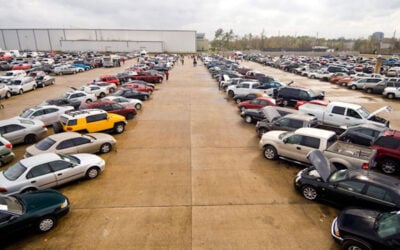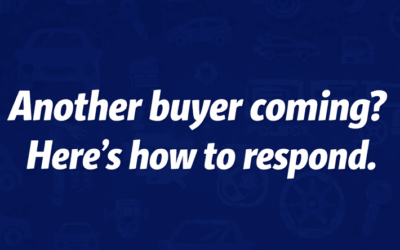What if I told you there was no such thing as an unsold new car? Every new car, no matter how expensive, ugly, or unpopular, gets sold to someone at some point. In my 42 years in the car business, I’ve never met a car that didn’t end up with a buyer.
What happens to cars that end up sitting on a dealership’s lot? When you phrase the question that way, there are a few winding roads that new vehicles can end up journeying. Most cars are sold to a consumer. Good dealerships try and “turn” their inventory every 90 days. That is to say, if they can sell a car within 90 days of it arriving at their dealership, they do.
When I was a new car sales manager I would incentivize my sales staff to sell the oldest cars on our lot. Why? Because our dealership has a carrying cost for the vehicle. It’s important you understand what a carrying cost is, because it’s the primary driver for why there is no such thing as an unsold new car.
Carrying costs incentivize dealerships to sell their inventory

You may not know it, but car dealerships are just like you and me, they don’t buy each of the cars on their lot outright. Odds are, you wouldn’t go to a dealership and buy a $40,000 car in cash (some people can, but most people don’t), and dealerships are the same, they don’t go to the manufacturer and purchase millions of dollars in vehicles in cash. Instead, they, just like you, finance the cars.
You’re most likely well aware that new cars are depreciating assets, they’re constantly losing value. Just because a dealership is buying a car from a manufacturer doesn’t change this equation. From the dealership perspective, each day that they don’t sell a car is a day they are cutting into their potential profit (they have to keep paying interest on their loan).
Dealers pay both the interest on their loan for the vehicle, and the opportunity cost of keeping that car longer. There’s finite space on their lot, so each one that sits and takes up space costs them money.
In an ideal world (for the dealership) each car they have on the lot would sell within days of its arrival, but you and I both know this doesn’t happen.
Why do cars go unsold?
Some dealerships I’ve worked for have had cars that celebrate birthdays (sit on the lot for more than 365 days without being sold). Why? I think it has something to do with ego, because most of the time it certainly doesn’t make business sense.
Most dealers are concerned with carrying cost (what we discussed above), and the largest dealers (the publicly traded ones) are measured by how quickly they can “turn” a car (move it from being on the lot to being in a customers hands).
Some dealers (in particular the old school ones) are steadfast that their staff should not discount a car to turn it more quickly. One dealer I worked for operated in this way, and we had many cars that would sit on the lot for well over a year.
Generally speaking, a car that sits on a dealer’s lot for 365+ days isn’t going to make the dealership any profit. However, in some cases the dealer can still find a way to make money.
Usually the cars that sit on a dealer’s lot for that long are relatively rare. What I mean by that, is that there aren’t many other cars with the exact trim level, or equipment, or color available. In my career, there were “new” cars I sold that were over a year old, and our dealership made a healthy profit on them simply because they were the only car in the country that included certain features.
In most dealerships cars really can’t go “unsold,” because that would upset shareholders (remember, the big public dealerships need to “turn” cars to keep their investors happy). However, in smaller, more “mom and pop” dealerships, “unsold” cars are more of a frequent occurrence.
What happens to unsold new cars?

Sold to the consumer
Selling a relatively rare car to a consumer is the first “path” an unsold new car can go down. If you’re looking to buy a car, consider letting me help. There are of course many other paths unsold new cars can travel down as well.
Service loaner or staff demo
At some dealerships older new cars are added to the service loaner fleet (the vehicles the dealership loans out to their service customers to drive while the car they own is being worked on) or as staff demos (cars the dealership staff can drive as a perk for working there). These cars are then converted to pre-owned inventory and marked down for sale.
If you’re looking to get a good deal on a new car, your best bet is to not buy a brand-new car at all. The truth is that a service loaner or demo are well-maintained cars and are lightly driven. This makes them great options for budget conscious car buyers who still want something “new.”
What happens if the car still doesn’t sell after being moved to “pre-owned?” This is where we enter the world of auctions. Automobile auctions are a foreign world to most, and with good reason, they’re restricted to registered dealers only, however they represent a multi-billion dollar industry with thousands of transactions occurring each day.
Auctions
Dealers will frequently send cars to auction that they haven’t been able to sell them at their dealership. This is about as close to “unsold” as a car can get. Sending a car to auction typically means taking a loss, but it’s more valuable for the dealer to take a small loss at the auction than it is to keep the carrying cost of the car on their lot. It’s a trade off, and one that a lot of dealers make.
Generally speaking, manufacturers (frequently referred to as the original equipment manufacturer, OEM) work diligently to stock their dealerships with the right mix of vehicles. By stocking the dealership with the right mix of cars, OEMs are able to support their dealer partners in turning vehicles quickly. But, when that mix goes awry, and dealers truly can’t get a car off their lot, they’ll send it to the auction.
Open auctions and closed auctions
There are two types of auctions, open auctions and closed auctions. An open auction is open to any authorized dealer personnel, regardless of brand represented or whether being a new or used car dealership. A closed auction is restricted to dealerships that are franchised to represent that particular brand.
As an example, Honda may hold several auctions each month that are closed to Honda dealers only. This is done for the express purpose of selling off Honda lease returns and factory executive demos while maintaining a higher per car value because Honda dealers are willing to pay a higher price for nice pre-owned Hondas for their lot.
What happens to your car when you trade it in?
Cars traded into a dealership that the dealer doesn’t want for their lot are sold at open auctions. At open auctions, any dealer is invited to buy as many cars as they may like. These types of auctions are where many used car dealerships buy the inventory for their lots, and where many “unsold” cars eventually end up.
There are a few primary marketplaces for cars, the largest being Manheim, owned by Cox Automotive. If a car is “unsold”, odds are high it ends up at a regional Manheim auction. Most likely, some dealership will buy it.
If you’re interested in learning more about why there is no such thing as an unsold car, let us know in the comment section below. I’d be more than happy to explain how dealerships make money by buying cars at the auction.
No car ever goes unsold

So there you have it, no car actually ever goes unsold. Whether it be a dealer who holds onto a car until the right buyer comes along (even if that takes over a year), or a new car that gets converted into a used car, or if a car goes to the auction, every car eventually finds a home.
In my 42 years in the car business I never once saw a car, no matter how ugly, poor performing, or otherwise, not end up with a buyer. Something tells me that trend will continue for the next 42 years too!








![10 Cars with the Lowest Cost of Ownership [2026 Data]](https://caredge.com/wp-content/uploads/2026/02/2026-Toyota-Corolla-Hatchback-400x250.png)




Great article… Can the normal person obtain a dealer license and attend the auctions you spoke about??
Are public auctions more of a crapshoot when it comes to buying a car? Meaning you take your chances on whether or not you’ll get a good vehicle or a piece of crap???
Thank you for your time..
What if a dealership gives you a car but later call you in and said that the bank didn’t approve and you already signed papers for the car.
You’ve already signed the papers and drove off the lot. That doesn’t necessarily mean anything. The dealership has their own financing company within, so I wouldn’t worry about it.
Please, everyone, take the time to read the federal and state [not [S]tate with a capital S] Rules of the highway. An Automobile is a TYPE of vehicle, not to be registered, a Household goods, Exempt from taxes. A Driver is an occupation. The question is, “Our you a PERSON?” Because ONLY a PERSON must follow the rules, and unless by DEFINITION it says, A Natural Person, then the definition of Person means Individual, corporation, partnership, but not a Natural Person, a living man/woman.
You must Rebutt the assumption, in an affidavit the treasurer of your county, you’re a natural person.
Claim ownership, the MSO is title, not a certificate of title, as the state claims. No heavyweight boxer ever held a, “CERTIFICATE of TITLE” so why do you?
If I told you these Automobiles on the lots are prepaid for we the people, you’d call me crazy, yes then call me crazy because it happens to be true. When you see the word “FUNDS” and not money in a contract or just in general, means a trust!
There are over 100 iRS forms. A 1099 A, 1099 B, 1099 C, Form 56 F, 1099 OID, Form 8281, 98 EIN, 83 EIN, just to name a few. Understand Bankruptcy, but not you, this country, Louis McFadden speech 1934,James Traficant speech, on the Bankruptcy of the U. S.
Yes. All one has to do is get the total bill. Use 1099-A form from IRS, file taxes and the vehicle is paid in full. The main reason people do not do this to payoff vehicle in full is due to Credit Scores being ran to finance. This is the trickery that each has to overcome.
Simply get total bill to purchase car in full. This is the remedy